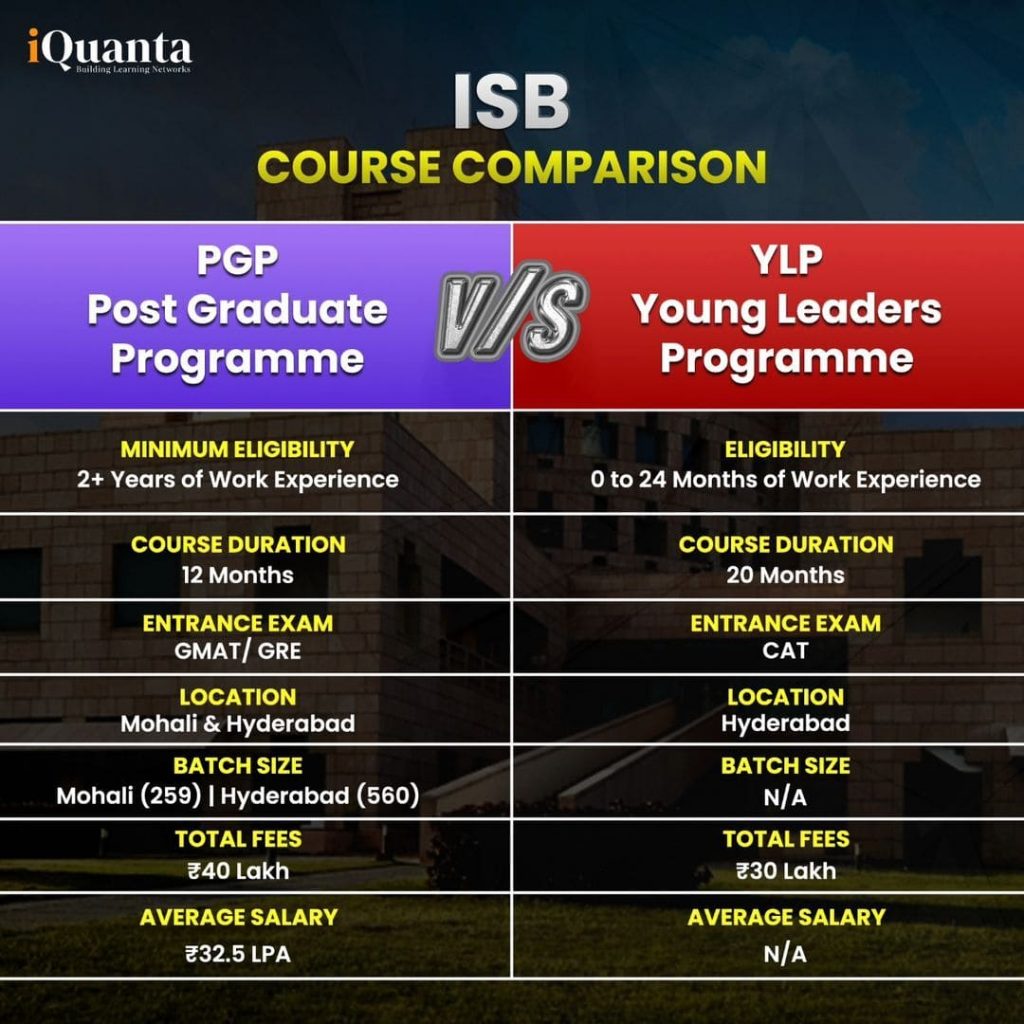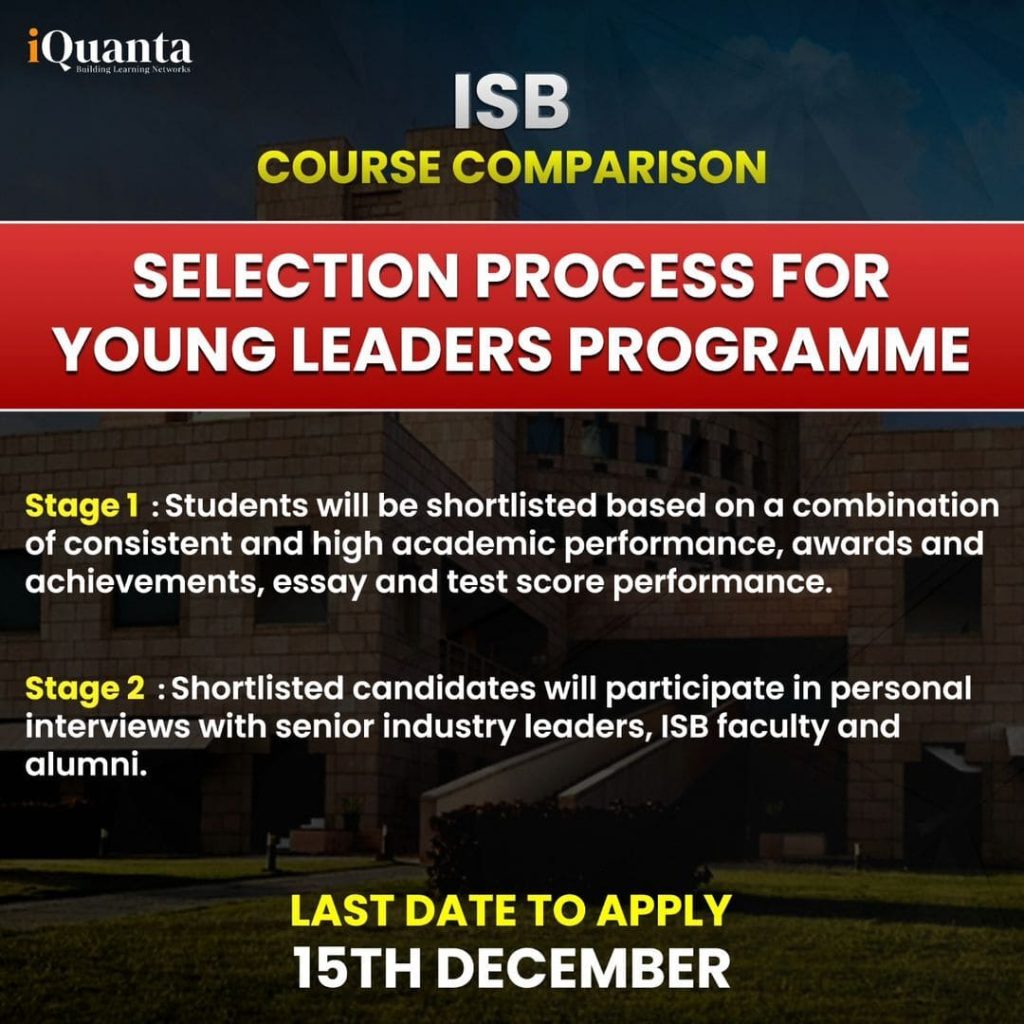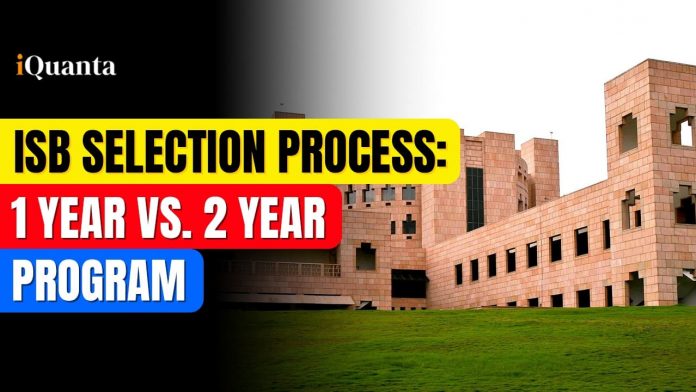In a significant shift, the Indian School of Business (ISB) is now accepting CAT (Common Admission Test) scores for its flagship management programs. Until recently, ISB primarily relied on GMAT (Graduate Management Admission Test) and GRE (Graduate Record Examinations) as entrance tests. However, by incorporating CAT into the selection process, ISB broadens its applicant pool, offering a new opportunity to those more familiar with this widely popular test in India. For aspiring candidates, this development opens up new avenues for applying to one of India’s premier business schools. In this article, we will delve into ISB’s program structures, the detailed selection process, and how CAT compares to GMAT and GRE as an entrance route for ISB.


ISB’s Program Offerings: A Look at the 1-Year vs. 20-Month PGP YL
One of the key differentiators of ISB’s offerings is its unique program formats. The school has built a reputation with its one-year Post Graduate Program in Management (PGP), which is designed for professionals looking to fast-track their careers. Unlike many Indian business schools that follow a two-year model, ISB’s one-year program compresses the MBA experience into a 12-month intensive curriculum. This model is ideal for individuals with prior work experience, providing them with the tools to leap into leadership positions quickly.
The one-year PGP program at ISB is known for:
- An accelerated curriculum: ISB condenses what is typically a two-year MBA program into just 12 months, offering a rigorous but rewarding experience.
- Experienced cohorts: On average, students in this program have 4-5 years of professional experience, which enhances peer learning and in-class discussions.
- Global partnerships: ISB’s collaborations with top international schools like Wharton and London Business School give students global exposure and opportunities to participate in exchange programs or take up specialized courses abroad.
On the other hand, for professionals with less work experience or recent graduates, ISB has introduced a longer-duration program known as the Post Graduate Program in Management for Professionals (PGP YL). This 20-month part-time program is tailored for those with early work experience (typically 0-2 years). It provides a foundational understanding of management concepts while accommodating the busy schedules of young professionals who may not have enough experience for the one-year PGP.
The PGP YL is designed for:
- Candidates with 0-2 years of work experience: Fresh graduates or early-career professionals who want to build a strong foundation in management.
- A more gradual pace: Spread over 20 months, this program allows candidates to balance their extracurriculars and academic commitments while gaining a comprehensive management education.
With ISB now accepting CAT scores for the 20-month PGP YL, it opens up opportunities for candidates at different stages of their professional careers to access world-class management education. The fees for the program including the hostel stay would be around 30 lacs for the entire duration of 20-months. Students will also be offered tuition fee waivers based on merit and meri-cum-need.

ISB Through CAT: What You Need to Know
By accepting CAT, ISB is catering to a large number of Indian candidates familiar with this test, which is the standard for many Indian business schools, including the IIMs. While the GMAT and GRE have global reach, the CAT is particularly recognized for entrance into Indian management programs.
Key Features of CAT for ISB Applicants:
- Indian-centric test format: Many candidates who apply to Indian business schools like IIMs are more comfortable with CAT, given its popularity and specific structure.
- Focus on quantitative and verbal skills: Much like GMAT, CAT assesses quantitative aptitude, logical reasoning, and verbal ability, but it has a unique pattern and scoring system.
ISB’s decision to accept CAT scores offers a huge advantage to Indian candidates who may not have prepared for GMAT or GRE but are already familiar with CAT. However, CAT alone does not guarantee admission; ISB’s application process remains holistic.
ISB Through GMAT: How It Compares
The GMAT has long been the primary test used by ISB for its admissions for its extremely elite one-year PGP Program. Like CAT, GMAT assesses quantitative and verbal reasoning skills but with a slightly different focus and structure. GMAT includes an analytical writing section and integrated reasoning, which are often seen as key components for assessing candidates’ decision-making skills.
The Role of GMAT in ISB Admissions:
- Global recognition: GMAT is widely used by business schools around the world, making it a popular choice for candidates targeting multiple international programs.
- Emphasis on analytical writing and reasoning: The GMAT includes sections that test critical thinking and the ability to analyze complex information, which are valuable skills for business leaders.
For candidates more comfortable with a globally recognized test format, GMAT may still be the preferred option. However, ISB’s move to include CAT offers flexibility for those who have focused their preparation on Indian tests.
Selection Criteria: A Holistic Approach
ISB’s selection process is designed to identify candidates with strong leadership potential, academic aptitude, and professional experience, but it varies slightly depending on the program you are applying for. Whether you choose to apply through CAT, GMAT, or GRE, ISB’s evaluation process focuses on several critical components. Here’s how ISB evaluates applicants for both the PGP (one-year) and PGP YL (20-month) programs.
1. Test Scores:
Your CAT, GMAT, or GRE score is an important part of the application process, but it does not solely determine admission. For both programs, a competitive score can enhance your profile, but it must be complemented by other strong elements. The scores demonstrate your academic preparedness and ability to handle the analytical and quantitative rigor of the curriculum.
2. Academic Performance:
Your undergraduate academic performance plays a significant role in the admissions process. ISB seeks applicants who have consistently performed well academically and have demonstrated strong analytical and problem-solving abilities. For both programs, candidates from diverse academic backgrounds (engineering, humanities, commerce, etc.) are encouraged to apply.
- For PGP (one-year), a strong academic record can bolster your application, particularly if you have pursued challenging courses in your undergraduate degree.
- For PGP YL (20-month), the academic record is important, but ISB is also looking for evidence of your commitment to learning and growth as you balance professional commitments with academics.
3. Work Experience:
Work experience requirements differ significantly between the two programs:
- For the one-year PGP, applicants typically have 4-5 years of professional experience. ISB values candidates who have demonstrated leadership potential, made impactful contributions in their roles, and have shown significant career growth. The program is best suited for mid-career professionals looking to transition to senior management roles or change career trajectories.
- For the PGP YL, ISB specifically targets early-career professionals with 0-2 years of work experience. This program is designed for those who are just starting their professional journey but exhibit a strong desire to develop leadership and management skills early on. While extensive work experience isn’t required, ISB looks for candidates who have demonstrated leadership potential in academic or extracurricular activities, internships, or entry-level jobs. The focus is on finding individuals who are ambitious, proactive, and eager to accelerate their career paths.
4. Essays:
The application essays offer insight into your motivations, personal values, leadership experiences, and career aspirations. Essays are a critical component of both programs, as they allow ISB to understand who you are beyond your test scores and resume. Through your essays, you can showcase your individuality, explain why you are interested in pursuing an MBA, and articulate how ISB fits into your personal and professional goals.
- For PGP (one-year), essays typically focus on your leadership experiences, your rationale for pursuing an MBA at this stage in your career, and your long-term career goals. ISB wants to understand how their program will help you achieve your aspirations.
- For PGP YL, the focus in essays shifts slightly towards understanding your motivation for pursuing management education early in your career, your leadership potential, and how you see yourself contributing to and benefiting from the program. Since PGP YL candidates usually have limited work experience, the essays are also a great opportunity to highlight your personal growth, achievements during internships or entry-level roles, and other relevant experiences.
5. Letters of Recommendation:
A strong letter of recommendation can significantly enhance your application by providing external validation of your leadership potential, work ethic, and performance. Recommenders typically come from professional supervisors, mentors, or professors who can speak to your achievements and potential.
- For PGP (one-year), the letter should ideally come from someone who has observed you in a professional setting, such as a direct supervisor or a senior leader in your organization.
- For PGP YL, a recommendation from a professor, mentor, or internship supervisor can be particularly useful, as these individuals can provide insights into your academic or early professional accomplishments and growth potential.
6. Personal Interview:
The personal interview is the final and often decisive part of the selection process for both programs. Conducted by ISB’s admissions team, the interview is designed to assess your fit with ISB’s culture and values, your clarity of thought, and your ability to articulate your career goals.
- For PGP (one-year), the interview often focuses on your professional experience, leadership qualities, and your reasons for pursuing an MBA at this stage in your career. Interviewers will want to hear about challenges you’ve faced, how you’ve handled leadership situations, and how ISB aligns with your future goals.
- For PGP YL, the interview will focus more on your academic background, leadership potential, and motivations for pursuing management education early in your career. Given that PGP YL applicants usually have less work experience, interviewers will assess your readiness to take on the challenge of a rigorous management program and how you envision utilizing the learnings to shape your professional future.
Conclusion: An Opportunity for Aspiring Leaders
The decision by ISB to accept CAT scores marks an exciting shift in the Indian management education landscape. With this change, a broader range of candidates can now apply to one of India’s most prestigious business schools, whether they prefer CAT, GMAT, or GRE. However, it is important to remember that test scores are only one part of the application process. A well-rounded profile, demonstrating leadership potential, academic excellence, and a clear sense of purpose, is essential for success at ISB.

